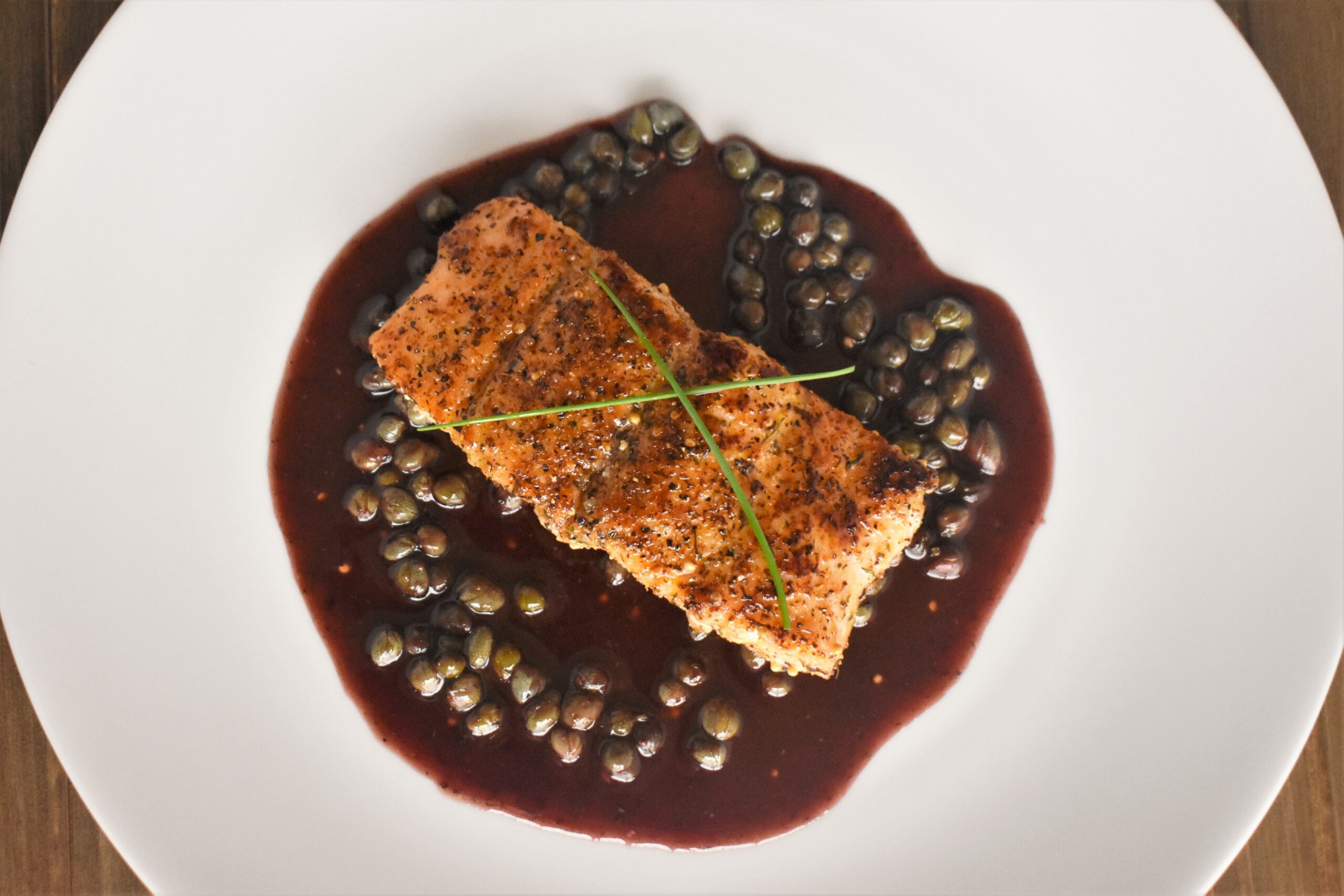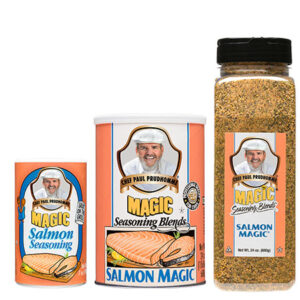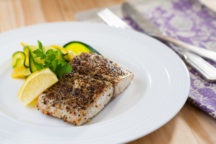
Share this on Facebook, opens in a new window
Share this on Twitter, opens in a new window
Share this on Pinterest, opens in a new window
Print this recipe

Servings
Makes 2 servings
Ingredients
2 (6-ounce) fresh salmon fillets, skinless
5 teaspoons Chef Paul Prudhomme's Salmon Magic®, in all
2 teaspoons olive oil
2 tablespoons capers, drained
5 tablespoons merlot wine, in all
2 tablespoons unsalted butter
5 teaspoons Chef Paul Prudhomme's Salmon Magic®, in all
2 teaspoons olive oil
2 tablespoons capers, drained
5 tablespoons merlot wine, in all
2 tablespoons unsalted butter
How To Prepare
Place a nonstick skillet over medium-high heat until hot, about 3 minutes.
Place the fillets on a small plate. Drizzle the oil over the fillets. Roll each fillet on the plate until evenly coated with oil on all sides. Place 2 teaspoons of the Salmon Magic® on a separate small plate. Roll one of the oiled fillets in the Salmon Magic® until evenly coated on all sides (almost all the oil should be gone). Repeat the process with the remaining fillet.
As soon as the skillet is hot, place the fish in the skillet, flat side down. Cook, turning frequently, until the undersides of the fillets are bronze in color, approximately 3 minutes. (Watch as the fish cooks and you'll see a white line coming up the side of each fillet as it turns from translucent to opaque; when one half of the thickness is opaque, the fish is ready to be turned.) Turn the fish and cook approximately 2 minutes longer. Remove the fillets from the pan and set them aside.
Add the capers to the pan and cook until the liquid on the capers has almost evaporated, about 1 minute. Add the remaining 1 teaspoon of Salmon Magic® and stir briefly. Add 4 tablespoons of the wine, stir well, then add the butter. Cook, stirring gently, until the butter has melted and the sauce is boiling. Stir in the remaining tablespoon of wine. Remove from heat.
Serve the fillets, 1 per plate with half of the sauce.
Note: To test for doneness, simply touch the fish in the center - - properly cooked fish will have a stiffer texture than partially cooked fish. You also can use a fork to flake the fish at its thickest part - - if it flakes easily, it is done. Do not overcook as the fish will continue to cook even after you remove it from the heat. You can turn the fish more than once or continuously until cooked to desired doneness. All cooking times are approximate. Be sure to remove all the skin from the fish. Even a small amount of skin will contribute an oily flavor to the dish.
Copyright © 2005 by Paul Prudhomme
Place the fillets on a small plate. Drizzle the oil over the fillets. Roll each fillet on the plate until evenly coated with oil on all sides. Place 2 teaspoons of the Salmon Magic® on a separate small plate. Roll one of the oiled fillets in the Salmon Magic® until evenly coated on all sides (almost all the oil should be gone). Repeat the process with the remaining fillet.
As soon as the skillet is hot, place the fish in the skillet, flat side down. Cook, turning frequently, until the undersides of the fillets are bronze in color, approximately 3 minutes. (Watch as the fish cooks and you'll see a white line coming up the side of each fillet as it turns from translucent to opaque; when one half of the thickness is opaque, the fish is ready to be turned.) Turn the fish and cook approximately 2 minutes longer. Remove the fillets from the pan and set them aside.
Add the capers to the pan and cook until the liquid on the capers has almost evaporated, about 1 minute. Add the remaining 1 teaspoon of Salmon Magic® and stir briefly. Add 4 tablespoons of the wine, stir well, then add the butter. Cook, stirring gently, until the butter has melted and the sauce is boiling. Stir in the remaining tablespoon of wine. Remove from heat.
Serve the fillets, 1 per plate with half of the sauce.
Note: To test for doneness, simply touch the fish in the center - - properly cooked fish will have a stiffer texture than partially cooked fish. You also can use a fork to flake the fish at its thickest part - - if it flakes easily, it is done. Do not overcook as the fish will continue to cook even after you remove it from the heat. You can turn the fish more than once or continuously until cooked to desired doneness. All cooking times are approximate. Be sure to remove all the skin from the fish. Even a small amount of skin will contribute an oily flavor to the dish.
Copyright © 2005 by Paul Prudhomme






